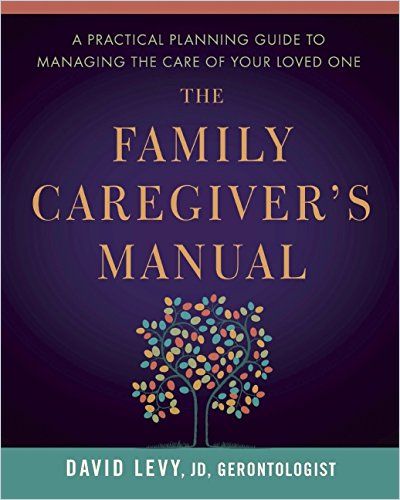Attorney and gerontologist David Levy offers a comprehensive actionable manual for anyone with a relative who needs daily care — or will in the future.

Compassionate Care
People today live longer than previous generations, but many older adults cannot afford institutionalized care. They must rely on their relatives and friends. Attorney and gerontologist David Levy’s sensitive, practical manual will help family members create a personalized plan to meet the challenges of being caregivers. Most family care — 85% — is nonclinical, but it can involve complex legal and insurance issues, transportation, family conflicts, physical limitations, and more. Levy offers a clear path through this intimidating and emotionally fraught thicket.
“The Family Caregiver”
You are a family caregiver if you provide legal, health, financial or social assistance to a relative or care for someone with special needs.
There is no magic bullet that can make family caregiving easy, but there are practical steps you can take that will make the burden more manageable for you and other caregivers in your family.David Levy
An “Alpha caregiver” makes the final decisions for the patient. “Primary caregivers” either provide care or monitor paid or volunteer helpers.
Self-Care
Caregivers can be prone to depression, and they can experience anger, sadness, resentment and guilt. Being flexible and open will help you overcome setbacks. Stay positive. Take care of yourself before you take care of others. Levy advises that you accept help, maintain balance, keep your personal identity separate from your role as a caregiver and attend a support group for family caregivers.
Purpose and Documentation
Families need a care-giving plan when a relative requires care. A successful plan states a defined purpose, a list of potential problems and solutions, realistic goals, ways to communicate those goals, shared responsibilities among family members, and more. A well-written plan preserves the independence and dignity of the caregiver and the patient, designates the alpha caregiver and includes everyone who shares caregiving.
Levy says to write your plan, and then review and revise it as circumstances change. Work with legal and medical professionals to prepare correctly executed fiscal, legal and health care documents. Keep them on hand.
There is an old saying, ‘If it ain’t write, it ain’t real.’ Even the most well-meaning person can forget spoken agreements.David Levy
Carry a one-page emergency sheet with you, and post a copy on your refrigerator and on your care recipient’s fridge as well. Include the person’s name, address and phone number, and their physician’s name and number. Add the preferred hospital and its phone number; note all current medications including dosage and frequency, any assistive devices — glasses, contact lenses, oxygen tank or walker — that the person uses, allergies, and emergency contact information.
Contingency Plans
Prepare a contingency plan. You may face objections from older family members who don’t want care. They may be in denial or worried about money.
In such circumstances, Levy says, be patient. Ask questions and try to understand why your relative is resistant. Don’t judge. Show your loved ones that you care about their opinions. Enlist help from people in regular contact with your older relatives — neighbors, clergy or friends who can watch for unusual behavior or problems.
Call family meetings early in the process. Some family members may be unable to help due to limitations of time, budgets or distance. Some might prefer to become hands-on caregivers, while others would rather provide emotional or financial support. Children and teens who need special care should help shape the plans that affect them. Consider having a certified family mediator, family counselor or social worker reconcile any conflicts.
Assisted Living
Pay attention to changes in behavior, such as Mom repeating the same story or Dad forgetting to dress properly. Don’t delay getting care. If the person who requires care takes multiple medications, ask your pharmacist about dosages and possible interactions.
Home is where we are most comfortable and where care is most affordable.David Levy
Most people prefer to receive care at home, but that may not be viable after a major illness or accident because of clinical, physical or safety issues. Other options include a skilled nursing facility, an assisted living facility or a special community that combines the two.
If you are helping a relative move to a facility, place items with sentimental value there ahead of time to make the new environment more welcoming.
Paid Caregivers
Ask your doctor what specific clinical skills an aide needs to care properly for your relative. Ask family members to contribute time or money. You can hire caregivers through a home health care agency or independently. Create a job description that outlines hours, specific duties, special abilities needed, desired personality traits, languages spoken, days off and compensation.
Do not expect things to go smoothly. Emotions are likely to run high as past issues are raised in response to this call for help. David Levy
Screen home health care agencies the way you would prospective employees. Check their licenses. Obtain references. Make sure the agency contacts job applicants’ references, conducts criminal background checks and carries liability insurance.
Create an employment contract. Spell out hours, pay, schedule, benefits, job duties, personal telephone use and a termination warning process. Watch for improper administration of medication, unsafe transportation, problematic financial issues, a lack of openness or a personality mismatch. If it’s not working out, fire your helper.
Managing Your Plan
Write your plan simply, and distribute it to everyone involved. You needn’t write the entire plan at once. Be sensitive to the needs of others; the plan will affect each family member differently. Have someone you trust review your completed plan to ensure that it’s clear and comprehensive.
A Welcome Manual
Levy’s comprehensive guidebook will be a boon to people concerned about caring for elderly relatives, special-needs children, or loved ones with injuries or chronic illnesses. Levy writes without any recognizable style and leaves his own emotions to the side, which turns out to be an advantage.
The earlier you discuss family caregiving needs, the better. David Levy
His indispensable guidance is compassionate, knowledgeable, clear, straightforward, detailed and presented in a way that makes it easy for you to grasp the entire process and its crucial nuances, even in times of stress. Levy calls his guidebook a “manual,” and follows that welcome concept from beginning to end.
Other books on caregiving include Toolkit For Caregivers: Tips, Skills, and Wisdom to Maximize Your Time Together by Deirdre Edwards; The Caregiver’s Toolbox: Checklists, Forms, Resources, Mobile Apps, and Straight Talk to Help You Provide Compassionate Care by Carolyn P. Hartley and Peter Wong; and The Caregiver’s Guide to Dementia: Practical Advice for Caring for Yourself and Your Loved One by Gail Weatherill, RN.








